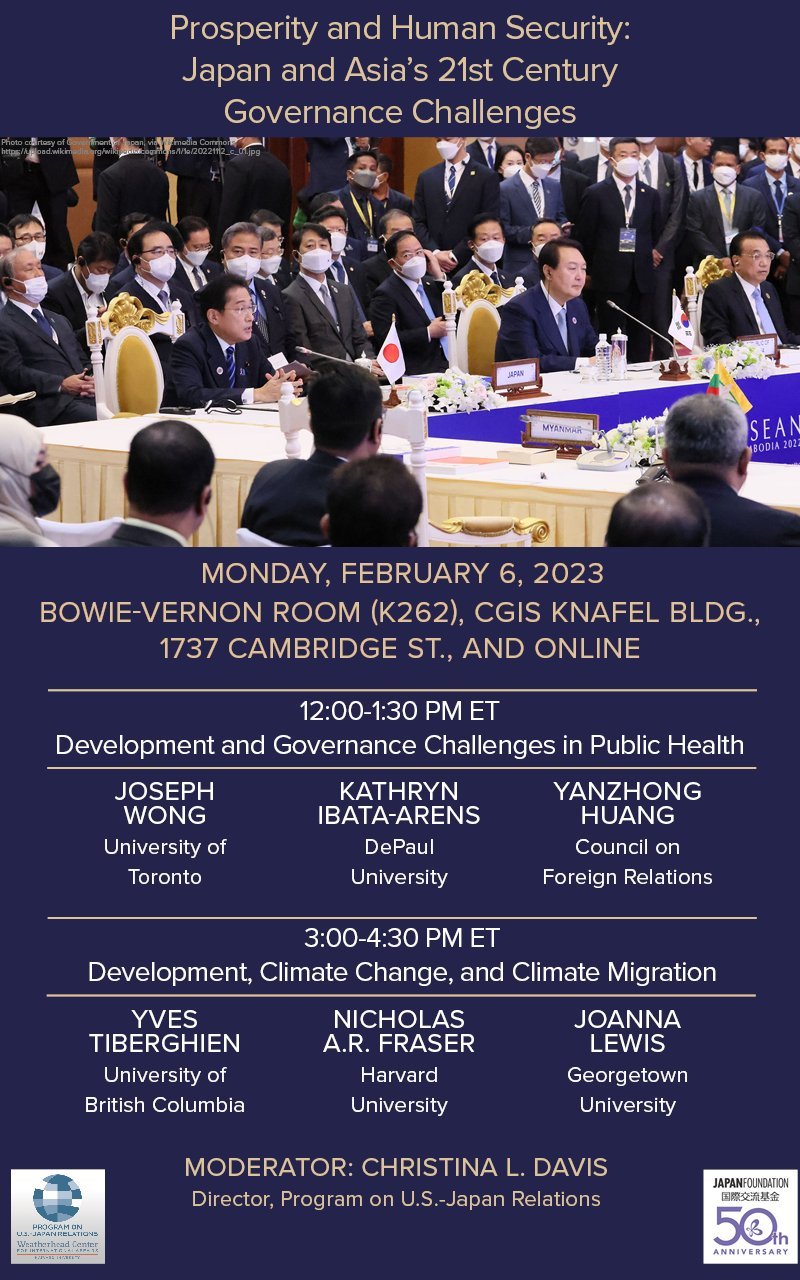
Annual meeting of the Society for the Advancement of Socio-Economics
Mini Conference 6: A Future for Health: Policies, Organizations, and Practices within Market and Social Transformations


Asia Economic Dialog 2023
Asia and the Emerging World Order
Pioneering Socially Responsible Business

Development and Governance Challenges in Public Health
Expert Panel at Harvard University

Japanese Studies Association Annual Meeting
“Kyoto and the Political Economy of Water: Ecological System Governance and Resilient Economies” Paper Presentation, Japanese Studies Association Annual Meeting, 5 January, Honolulu, 2023.

Mini-Conference Medicines and Health, SASE Amsterdam
Contested Spaces and Disrupted Markets: Controversies in the Struggle for Innovation and Control of Health and Medicines


International Studies Annual Meeting | Online Flash Talk
Representing 100 countries, ISA has over 6,500 members worldwide and is the most respected and widely known scholarly association in this field. Endeavoring to create communities of scholars dedicated to international studies, ISA is divided into 7 geographic subdivisions of ISA (Regions), 29 thematic groups (Sections) and 4 Caucuses which provide opportunities to exchange ideas and research with local colleagues and within specific subject areas.

Association of Asian Studies Annual Meeting | Roundtable
The Association for Asian Studies annual conference is the largest academic conference worldwide dedicated exclusively to Asian Studies research with topics covering all countries in Asia across 30 academic disciplines. The AAS annual conference is the ideal setting to meet face-to-face with senior and junior faculty in the field as well as students, administrators, librarians, foundation and museum staff, and program managers alike.

OIST Foundation: Science Innovation Book Talk - Webinar
…Beyond Technonationalism: Biomedical Innovation and Entrepreneurship in Asia uses the lens of venture start-up firms in China, India, Japan, and Singapore, finding a new “networked techno-nationalism” guiding national policy and firm-level strategy supporting competitive growth in frontier technologies. In her journal articles, blogs, policy briefings, podcasts, and books, Ibata-Arens employs such methods as historical-institutional, policy and social network analysis, and original fieldwork-based case studies, contextualized within global politics and markets.

The Hale Report: with Kathryn Ibata-Arens on Technonationalism
The Hale Report interviews Kathryn Ibata-Arens, Vincent de Paul Professor of Political Science & Director of the Global Asian Studies Program at DePaul University. Her new book, Beyond Technonationalism, Biomedical Innovation and Entrepreneurship in Asia is published by Stanford University Press. An expert in Japan, she spent six years researching entrepreneurship in four countries, Japan, China, India and Singapore. Among her conclusions, just the right amount of protection and openness, combined with size and distance to internal and external markets, leads to the successful competition in biomedical markets. She calls this theory of state Networked Technonationalism or NTN.

Japanese and American Innovation in a Global Age
Both the United States and Japan have long taken pride in their robust scientific research communities’ contributions to economic growth and human welfare. But the slowing pace and rising costs of state-sponsored research, along with strong competition from China and India, have challenged both governments to rethink their approaches to science and technology policy and set agendas that encourage innovation toward solving big social problems.

Scientist: Podcast Talk
Kathryn Ibata-Arens is Vincent de Paul Professor of Political Science and Director of the Global Asian Studies Program at DePaul University in Chicago, IL. We talk about political economy, service to the Japanese American community, and having a family.
